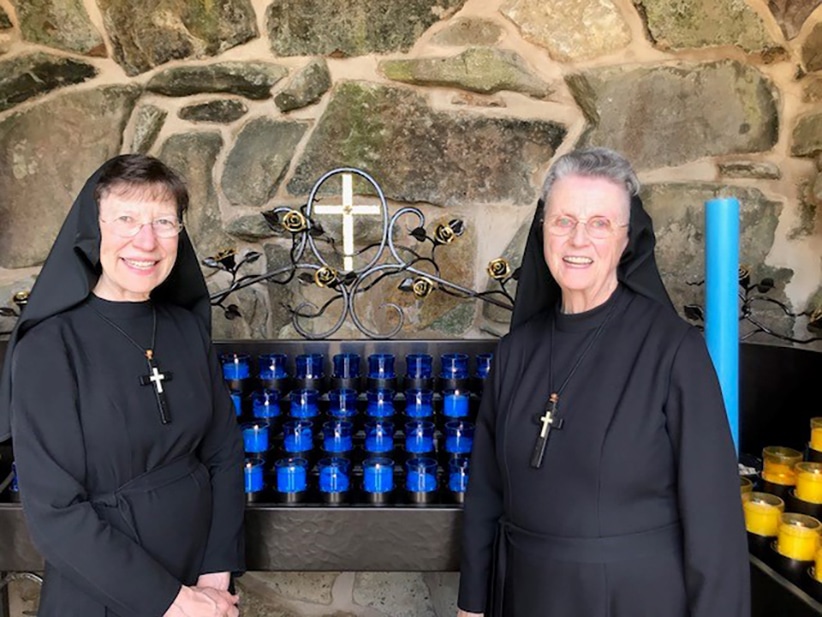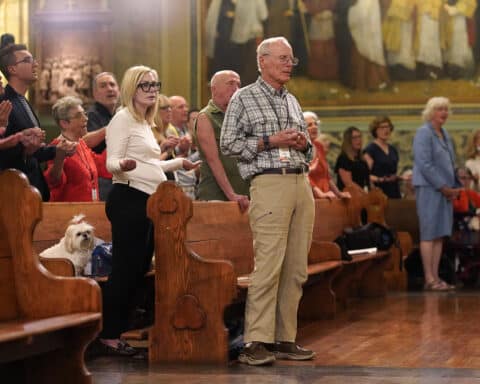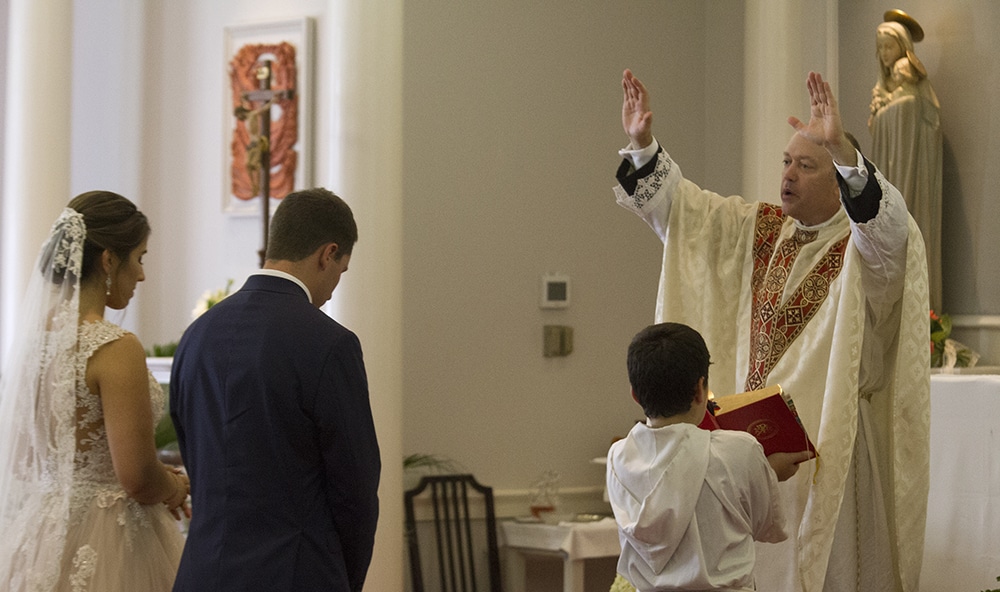Prayer is the lifeblood of vocations — both discerning one and living it out. If a strong prayer life fades away, so, too, does the vocation, according to Msgr. John Esseff, a priest in the Diocese of Scranton, Pennsylvania, who was a spiritual director to St. Teresa of Calcutta. At 91 years old, he has been a priest for 67 years and an exorcist for more than 45 years. He assisted the founders of the Institute for Priestly Formation and is still a retreat leader and spiritual director to bishops, priests, sisters and seminarians.
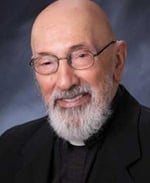
Msgr. Esseff explained in an interview with Our Sunday Visitor that he could have lost his own vocation during the 1960s if not for what he felt were the proddings of the Blessed Mother and a spiritual director who helped him to see that he was letting his many activities push prayer out of his routine.
“We hear that we are in a crisis with the sexual problems or the financial crisis and the vocation crisis,” Msgr. Esseff said. “But I really believe that we do not have any crisis except for prayer. We have a prayer crisis. Those who set prayer aside abandon the most important part of their vocation.”
Prayer is about building and maintaining one’s relationship with God and listening to him, Msgr. Esseff said. “Jesus said, ‘Thy kingdom come, thy will be done.’ The relationship that Jesus had with his Father was primarily listening. He came to do the will of his Father who sent him.”
Building a strong prayer life, therefore, begins not with self-reliance but with receiving from God, Msgr. Esseff explained. “Only the Father gives. Jesus received from the Father. Jesus said, in John 14:20, everything that he was, he received from the Father. And in Matthew 11:27, Jesus said: ‘No one knows the Son except the Father, and no one knows the Father except for the Son and those to whom the Son chooses to reveal him.’ Without Jesus and without prayer, I can’t do anything,” he said. “And because Jesus prayed, I pray.”
Prayer makes perseverance possible
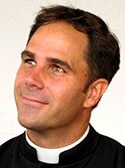
Father Donald Calloway, vocations director of the Marians of the Immaculate Conception and author of the book “Consecration to St. Joseph: The Wonders of Our Spiritual Father” (Marian Press, $17.95), described prayer as essential to preserving one’s vocation.
“Through a prayer life, the Holy Spirit fills you with that ability to go forward even in the midst of great difficulty,” he said. “I see people that leave the priesthood or have a crisis in their vocation also have a prayer life that went to pot at the root of it.”
When speaking with young men discerning a call to the priesthood, Father Calloway tells them to continue what they are already doing.
“Most people discerning a vocation have a prayer life or they would not be able to hear that call,” he said. “I encourage them to also have a devotion to Our Lady and pray the Rosary every day and spend time before the Blessed Sacrament.” He warns them to expect discouragement from the devil who will try to tempt them away from a good relationship with the Lord. “Prayer,” he said, “helps to persevere through it.”
For those excited about a recent conversion or reversion, Father Calloway points out that there is a natural honeymoon stage that does not last forever.
“I had a radical conversion, and it was wonderful, but then I had to go through the daily decision to continue the relationship even when it did not feel good. That is where love is tested and proven. If you do not persevere in prayer, you are going to turn to other things that offer immediate gratification.”
Prayer helps discernment
Sister Mary Kathleen Ronan of the Religious Sisters of Mercy of Alma, Michigan, is the director of the lay formation program for the Archdiocese of St. Louis. She has been a sister for more than 50 years. Sister Mary Kathleen recalled the old Baltimore Catechism’s question, “Why did God make me?” The answer is: “God made me to know him, to love him and to serve him in this world, and to be happy with him forever in heaven.”
“But how do you share in his life if you don’t even say hello?” Sister Mary Kathleen said. “In every time and every place, God calls man to seek him, to know him and to love him.” It is prayer, she explained, that makes that possible.
It was through prayer, that she discerned her own vocation, although initially she resisted.
“I went to confession to a priest who told me to pray and say to God, ‘Show me your will and then give me the strength to do it.’ He also encouraged me to go to daily Mass.” She credited prayer and the Eucharist as giving her the strength to say “yes” to God.
“I was sure I would be miserable, but once I entered the convent, I never regretted it for an instant,” she said. “Prayer helps to form our hearts. It gives a greater freedom from my own self-love through the very contemplation of the Lord.”
Sister Mary Kathleen also said that pondering the life of Jesus through Scripture and prayer — the pinnacle of that being the Mass — enables her to persevere. She learned that lesson many years ago from a sister she thought was very holy yet still asked for prayers.
“That sister understood: ‘Lord, I am persevering today by your grace, and by your grace, I will persevere tomorrow. She knew she needed prayer for that.”
Developing prayer habits in seminarians
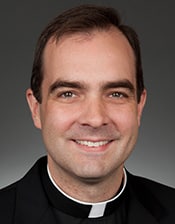
According to Father Carter Griffin, rector of St. John Paul II Seminary in Washington, D.C., and the author of “Why Celibacy?: Reclaiming the Fatherhood of the Priest” (Emmaus Road, $24.95), the entire priesthood revolves around union with Jesus through prayer.
“Prayer enlightens our mind, strengthens our will and increases our thirst for souls,” he said. “A priest who doesn’t pray is like a soldier going into battle empty-handed.”
The highest prayer of the Church and the very source of its life is the Mass, and the sacraments are the arteries of grace both for priests and for the people he serves, Father Griffin explained. Thus, a priest should pray the Mass daily, and he recommends weekly confession.
At ordination, priests promise to pray the Liturgy of the Hours (also called the breviary) each day for the needs of his people and for the Church as a whole.
“A seminarian should also have a vibrant interior life fueled by personal mental prayer, which most spiritual masters agree should be at least an hour a day,” Father Griffin said. Ideally, he said that would be in front of the Blessed Sacrament in adoration.
“Finally, a priest will generally have two other practices built into his day: spiritual reading and devotion to the Blessed Virgin Mary, typically by praying the holy Rosary,” he said. “Many will also include other devotions such as the Angelus and the Divine Mercy Chaplet.”
When seminarians first arrive, Father Griffin said that the hour of adoration each day can seem difficult to some, in addition to typically praying lauds and vespers in community, but over time, they begin to take on even more practices of prayer expected of a priest, such as a daily Rosary and all five “hours” of the Liturgy of the Hours.
“We spend a lot of time teaching them ways to use that time in adoration well, how to handle the usual distractions in prayer and how to find time for mental prayer even when away from the seminary, such as at home on break.”
By the end of their first year in seminary, Father Griffin said they have grown to love their quiet time with the Lord each day.
“Even when it is difficult or dry, there is something so beautiful and peaceful about just sitting or kneeling in the presence of the Lord,” he said. “It’s like radiation therapy, just receiving his love.”
Patti Maguire Armstrong writes from North Dakota.

